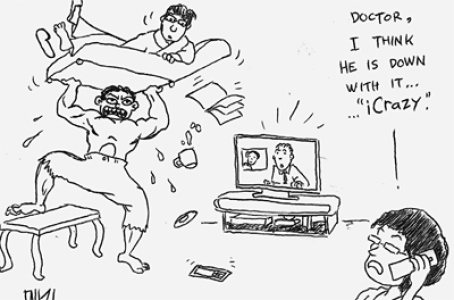From Twiplomacy to Twidependency
Professor Tan Sri Dato' Dzulkifli Abdul Razak
Learning Curve: Perspective
New Sunday Times - 05-08-2012
PERVASIVE ISSUE: Getting to grips with addiction associated with the use of Information and Communications Technology
THE influx of electronic gadgets into our lives is matched by new words and acronyms, at times coined to attract attention and as a sales pitch. The latest is "Twiplomacy" apparently to encourage a form of competition among Twitter fans.
New Sunday Times - 05-08-2012
PERVASIVE ISSUE: Getting to grips with addiction associated with the use of Information and Communications Technology
THE influx of electronic gadgets into our lives is matched by new words and acronyms, at times coined to attract attention and as a sales pitch. The latest is "Twiplomacy" apparently to encourage a form of competition among Twitter fans.

But there are other less well-known buzzwords too, for example "phantom-vibration syndrome" and "FOMO" (Fear Of Missing Out). How about "iDisorder"? Or "iCrazy"-- the cover story of the Newsweek (July 16) that inspired this column?
Soon, Twidependency will read "obsessive compulsive disorder" (OCD), more commonly called "Internet-related psychosis".
To link such terms to technology was at one time sneered upon as alarmist for not being IT savvy.
Just like the glorious days of smoking tobacco, those who spoke against the newly acquired habit were frowned upon.
It took almost five decades for reality to sink in that tobacco kills. It is tragic considering the millions of lives lost in that time. It is a very high price to pay.
In the case of Information and Communications Technology (ICT), evidence indicates that all is not well. Unless we are prepared to listen more intently, modify our habits and change our perceptions, then similar "tobacco-kills" episode may come to haunt us sooner than we think.
It has been documented that, on average, a teenager processes some 3,700 texts a month, double that in 2007.
As many as 60 per cent of them reportedly felt their phones vibrate when in fact nothing was happening, leading to the "phantom-vibration syndrome".
Susan Greenfield, a renowned neuro-pharmacology professor at Oxford University in the United Kingdom, summed up the situation well. "We could create the most wonderful world for our kids but that's not going to happen if we're in denial and people sleepwalk into these technologies and end up glassy-eyed zombies."
The use of "sleepwalk" is perhaps apt to describe how little we know of what such technologies can do to us, or our brain, especially when we are unknowlingly overexposed to them.
A Stanford study of iPhone habits of 200 people cited in the Newsweek article found that one in 10 users feels "fully addicted" to his or her phone; all but six per cent of the sample admitted some level of compulsion, while three per cent would not let anyone else touch their phone!
Addiction associated with the use of ICT and mobile devices is not new. The Diagnostic and Statistical Manual of Mental Disorders -- a reference for psychiatrists -- will be including "Internet Addiction Disorders" as a new category in the latest edition to be released next year. Some countries such as China, Taiwan and Korea reportedly are more aware of this and are taking positive steps to check the related potential health crisis.
Peter Whybrow, the director of the Semel Institute for Neuroscience and Human Behavior at University of California, Los Angeles in the United States has argued that "the computer is like electronic cocaine"-- creating mood swings for users.
The possibility of "structural abnormalities" in the brain due to such effects can no longer be discounted.
In a book appropriately titled iDisorder (2012), author Dr Larry Rosen points to the changes to the brain's ability to process information and to relate to the world due to daily use of media and technology resulting in symptoms of psychological disorders such as stress, sleeplessness and a compulsive need to check in with the technology.
More recently, The Times of India (May 10) carried a report on cases showing clear signs of "Facebook addiction" similar to those exhibited by people hooked on drugs, alcohol and other chemical substances.
In yet another article in the prestigious journal Pediatrics, the rise of a new phenomenon called "Facebook depression" is being discussed.
In short, ICT addiction moments are fast unfolding before our eyes. We cannot ignore them anymore.
It can be worse than the use of any habit-forming substance since technology is much more pervasive, and has longer lead time given that the starting age gets even younger as society becomes more IT savvy and there is greater ease of use. It is bound to penetrate deeper into our daily lives, setting the stage for Twidependency.
Many more will be hooked for life until we get to grips with such addictive technologies. Unless we know how to resist being dependent on technology, we will be enslaved by it! These issues are far more important to consider than arguing if mobile phones should be allowed in schools.
Once we are disciplined enough to make an informed decision and are able shake off FOMO, we are at peace with ourselves, regardless of whatever gadget comes and goes.
Life goes on even without the superfluous gadget and, at most times, the quality of life is far better.
- The writer is the vice-chancellor of Albukhary International University
